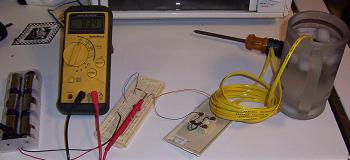Here's a couple of points to get you started. Preliminarily I am got wierd results, until I realized that the ohm meter wasn't working right. Fortunately the volt meter was working. I had a 3200 Ohm 2% resistor, so I could set up a voltage divider circuit. I havn't found my thermometer, so I only had a couple of reliable reference points. Below are the measurments for those points to date. As soon as I locate my good mercury thermometer (and possibly fix my meter or find another one that's working), I will post more data points.

at 0 deg. Celsius, total voltage 7.23 volts, voltage across 3200 ohms .0834 volts
at 21.7 deg. Celsius, total voltage 7.23 volts, voltage across 3200 ohms .2083 volts
at 100 deg. Celsius...(just kidding, I wasn't sure it would survive)
This yields a measured resistance of approximately 277 Kohms at 0 deg. Celsius and 111 Kohms at 21.7 deg. Celsius.
Keep having fun, Rich Hagen